
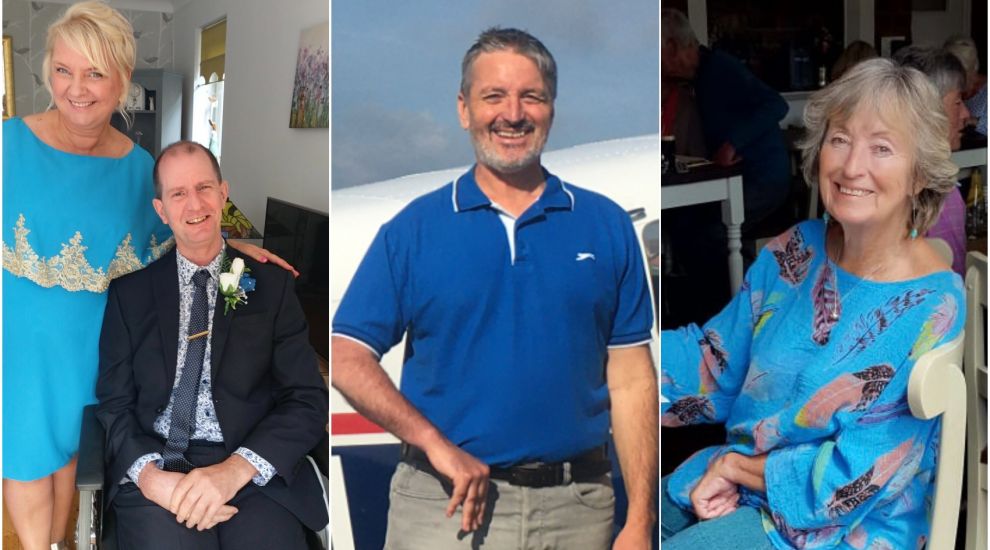

Stroke survivors and their families have opened up about their experiences of fantastic care at Overdale's Samarès rehabilitation ward – and their "upset" at the level of support being offered since its closure.
Pam Evans, who had a stroke in 2004, and Diane Saralis, whose husband Mark had a stroke in 2019, are among those with experience of the island's rehabilitation services calling on politicians to support a move to reopen the ward, and ensure that a similar facility is included in the new hospital.
Fundraiser and campaigner Ant Lewis, who had a stroke in 2007, has also shared his experience of "excellent care" on the ward.
States Members will decide whether to reopen Samarès next week, when a proposition presented by Senator Steve Pallett is debated.
The proposal has been rejected by the Health Minister, who argues that his department is building a better system of rehabilitation for stroke and head injury survivors, based on the Jersey Care Model, which promotes care at home and in the community where possible.
This means, he says, that a smaller, more flexible inpatient rehabilitation unit is required.
Express spoke to Mrs Evans, Mr Lewis and Mrs Saralis to hear their stories and why they think Samarès Ward was the right environment for them...
Former teacher Pam Evans had a stroke in 2004 on her 56th birthday and spent three months in recovery and rehabilitation on Samarès Ward.
She is adamant that the care she received there, and the privacy, space and facilities the ward provided, contributed significantly to her return to as normal life as possible, post-stroke.
Since Samarès Ward closed as a rehabilitation unit, Pam has campaigned for its reopening, as well as calling for the new hospital to replicate its faculties.
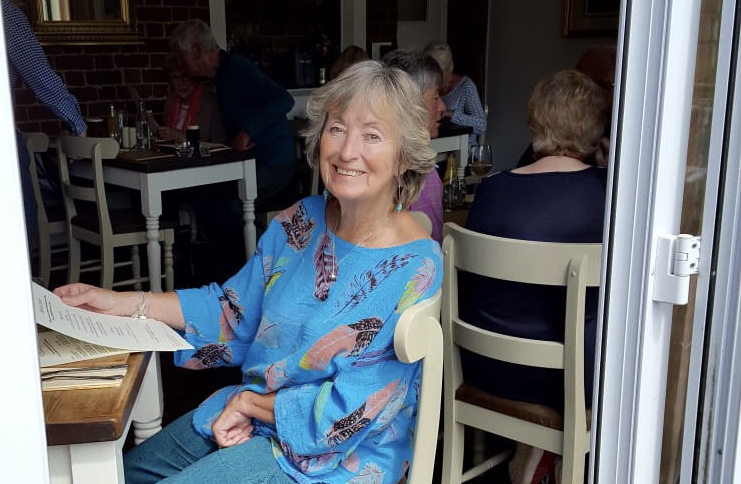
Pictured: Former teacher Pam Evans had a stroke in 2004 on her 56th birthday.
Health Minister Richard Renouf, however, says that rehabilitation can be provided in many different settings, from inpatient or outpatient hospital settings, to GP surgeries, or community settings such as an individual’s home.
He said. “It is timely in the context of the Jersey Care Model that we look at how and where these services are delivered moving from them being centred from within a particular unit to being available in a much broader range of settings, for a much broader range of conditions.
“It is logical when considering how these services look in the future to think about the people involved first, both patients and practitioners, before thinking about facilities.
“Since the objective is to return to a normal or near normal way of life it is also logical to expect that services where possible need to be delivered in the community and as close to Islanders’ homes as possible.”
Pam, however, questions that argument, based on her own experiences, and speaking to other stroke survivors.
“When I was on Samarès Ward there were 23 beds, each in their own room, which I think later went up to 27 after improvements made only a few years ago,” she said. “Having my own room was incredibly important. I could have visitors, including my three-week-old grandchild, without disturbing other patients.
“Having a stroke is an incredibly traumatic experience; you really go through a grieving process, so having my own room gave me the privacy to cry as well as rebuild.
“Recovery requires a lot of multi-disciplinary support, and having a room allows that team to gather without disturbing anyone else. How can you rest on a ward when you are painfully tired and there is a lot of noise?
She continued: “With most specialists based at Overdale, the physio, or other staff, could come back to me if I was tired. There was also a fully equipped gym; I understand Plémont doesn’t have anything like the quality of facilities that Samarès had.
“The gym was a very daunting setting at the beginning but it becomes an important focus of your recovery; a place where you know you’re getting stronger.
“Samarès also had its own dining room, kitchen and a fully equipped flat, where patients could relearn basic skills such as boiling a kettle and preparing a meal. Some patients stayed there for a couple of days to see if they could cope on their own and it was an excellent asset.
“There were also some smaller private rooms that patients could use. I remember a friend once brought a Chinese takeaway and a bottle of wine, which she set up in a room. We sat there and eat together – it was a huge psychological step for me as it was one of my first tastes of normality. I saw then that there was a life after having a stroke.
“The plan, as I understand it, is for a maximum six-week stay on Plémont and then a care package after that, but the problem is there is no neurological community support team.
“I’m very upset by the standard of care being offered now. I have also spoken to people who have had strokes relatively recently and they are terribly, terribly unhappy.”
Well-known stroke charity fundraiser and disability campaigner Ant Lewis, who has been left with a communication difficulty called aphasia, also shared his experience.
Pictured: Ant Lewis (right) spent six months on the ward after his stroke.
"In November 2007 I suffered a stroke following a clash of heads playing football.
"I spent a couple of weeks at the general hospital before moving to Samarès Rehabilitation Ward at Overdale.
"When I went there, I could not walk or talk.
"I spent six months on Samarès Ward and received excellent care from the nurses and therapists.
"Every day the therapists made me work in the gym. it was painful and tiring but bit by bit, I took my first baby steps.
"By the time I left Samarès Ward, I was beginning to walk but my speech had not returned.
"By 2010 I had completed the Jersey Marathon. In 2012 I cycled with lots of friends from the Stroke association from London to Paris.
"None of this would have been possible without the rehabilitation I received on Samarès Ward."
The wife and carer of a well-known sportsman who suffered a serious stroke in 2019 has said that she is “astonished and saddened” that the Community Stroke Team at Overdale has been disbanded and services moved to the General Hospital.
Diane Saralis, husband of Mark, said she hoped that States Members supported a proposal to reopen Samarès Ward at Overdale or provide a similar facility elsewhere.
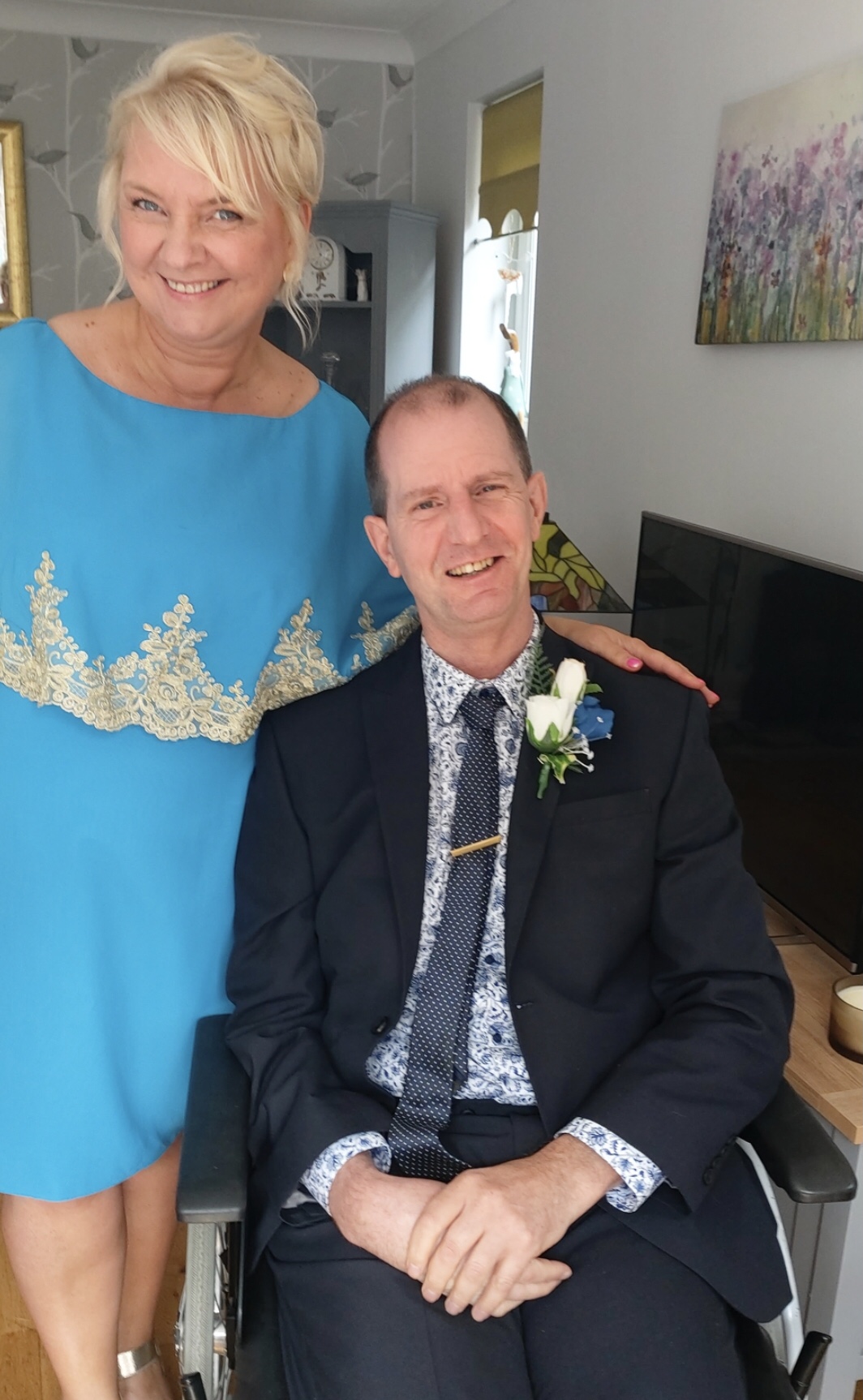
Pictured: Diane and Mark Saralis. Mark had a stroke in 2019 when he was 55.
She said: “My husband Mark suffered a major stroke at the age of 55 in August 2019, leaving him with life changing disability including aphasia, partial paralysis, problems with thinking and memory, sensory problems and limited mobility.
“Before his stroke, Mark was fit and healthy, he enjoyed many sports and worked for the States as a Probation Officer.
“Obviously, he had to give up work, as had I, in order to become his full-time carer. To say we were devastated and totally unprepared for such an incident would be an understatement. Our life from the moment of the stroke changed beyond recognition.”
She continued: “Mark’s treatment journey included admission to A&E, followed by ICU, Plémont Ward, Southampton General Hospital and back to Plémont. He was then placed on a waiting list for Samarès Ward where he was an inpatient for seven months. Once home he was supported at by the Community Stroke Team.
“At the point of transfer to Samarès Ward, the medical team deemed Mark physically fit enough to participate into a stroke rehabilitation programme. However, Mark was totally dependent on nursing staff and specialist equipment to meet his very basic human needs.
“He had problems with his eyesight, swallowing, loss of body control including body posture, walking and balance. He could not sit up without support, stand, walk or talk.
“He was not able to communicate effectively enough to let his needs be known, he could not even roll over in bed independently. This was so distressing and frustrating for Mark and all his family and it was almost impossible to see how he was going to be able to overcome these enormous challenges.
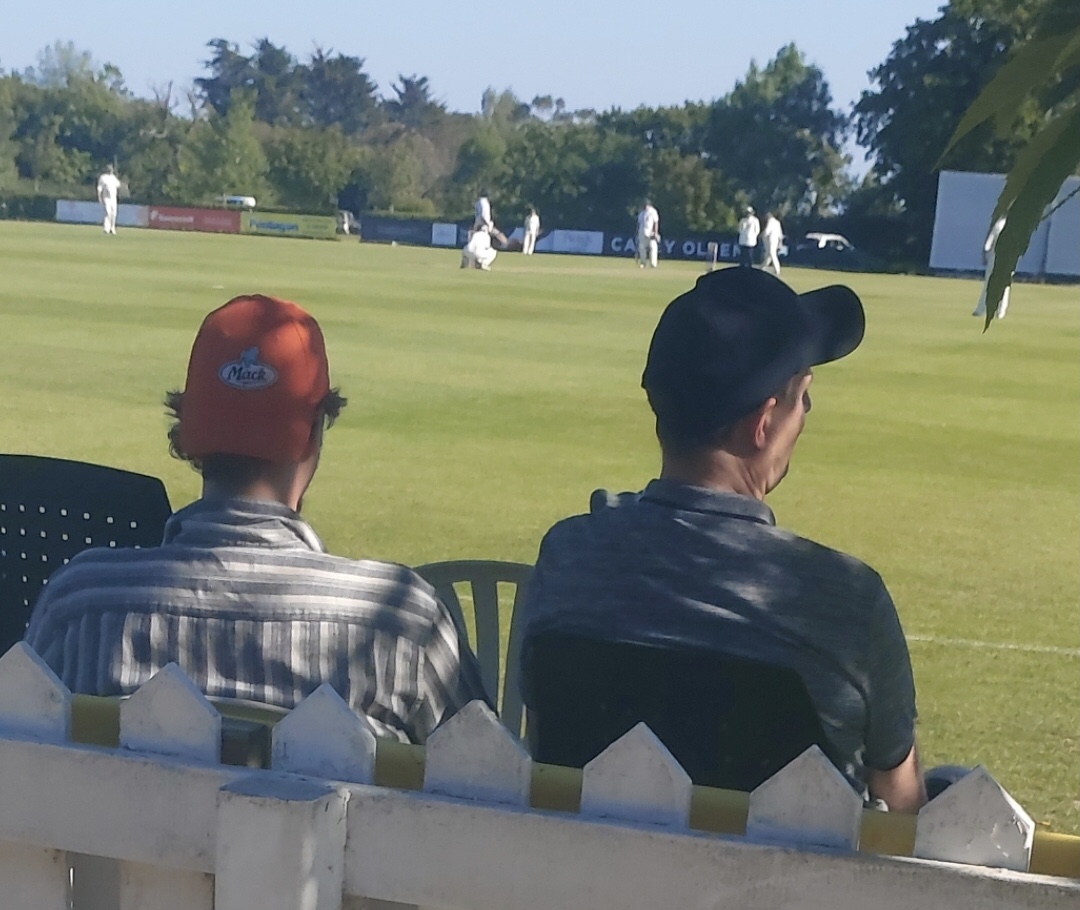
Pictured: Before his stroke, Mark was a talented sportsman, including on the cricket ground.
“By the time Mark was eventually discharged back home from Samarès Ward, he was able to use his balance more effectively, he was able to eat independently, he had gained skills to communicate despite not having any effective speech.
“He had gained confidence to be in the company of other people and he managed to avoid depression, which is very common with people who experience stroke. For my family and I, we too had to learn new skills to help support Mark as well as personal struggles coping with the change.
“We were advised on changes we needed to make to our home. Family, friends, and work colleagues rallied around to adapt our home in time for Mark’s discharge.
“All these positive changes were attributed to the skills, expertise, guidance, support and continuity of care from the Samarès rehabilitation team.
“Rehabilitation helps people with all kinds of brain injury, including stroke, to relearn new skills that are suddenly lost when part of the brain is damaged.
“Even though rehabilitation does not reverse brain damage, it can substantially help a stroke survivor achieve the best long term out come and improve quality of life. Rehabilitation also teaches new ways to compensate for any remaining disabilities.
“Rehabilitation requires a continuity of care, a personalised meaningful care plan, a multi-disciplinary approach, a mixture of time, dedication, support, understanding of the condition, the right specialised care staff and a conducive environment for the person to optimise the best therapeutic outcomes.
“All these ingredients were in place during our experience of Samarès Ward. But Samarès Ward was only the beginning of Mark’s rehabilitation journey.
“Once home, he was faced with many new challenges. I now realise how privileged we were to experience the full force of the Community Stroke Team, which was made up of an Occupational Therapist, Physiotherapist, Psychologist and Speech and Language Therapist.
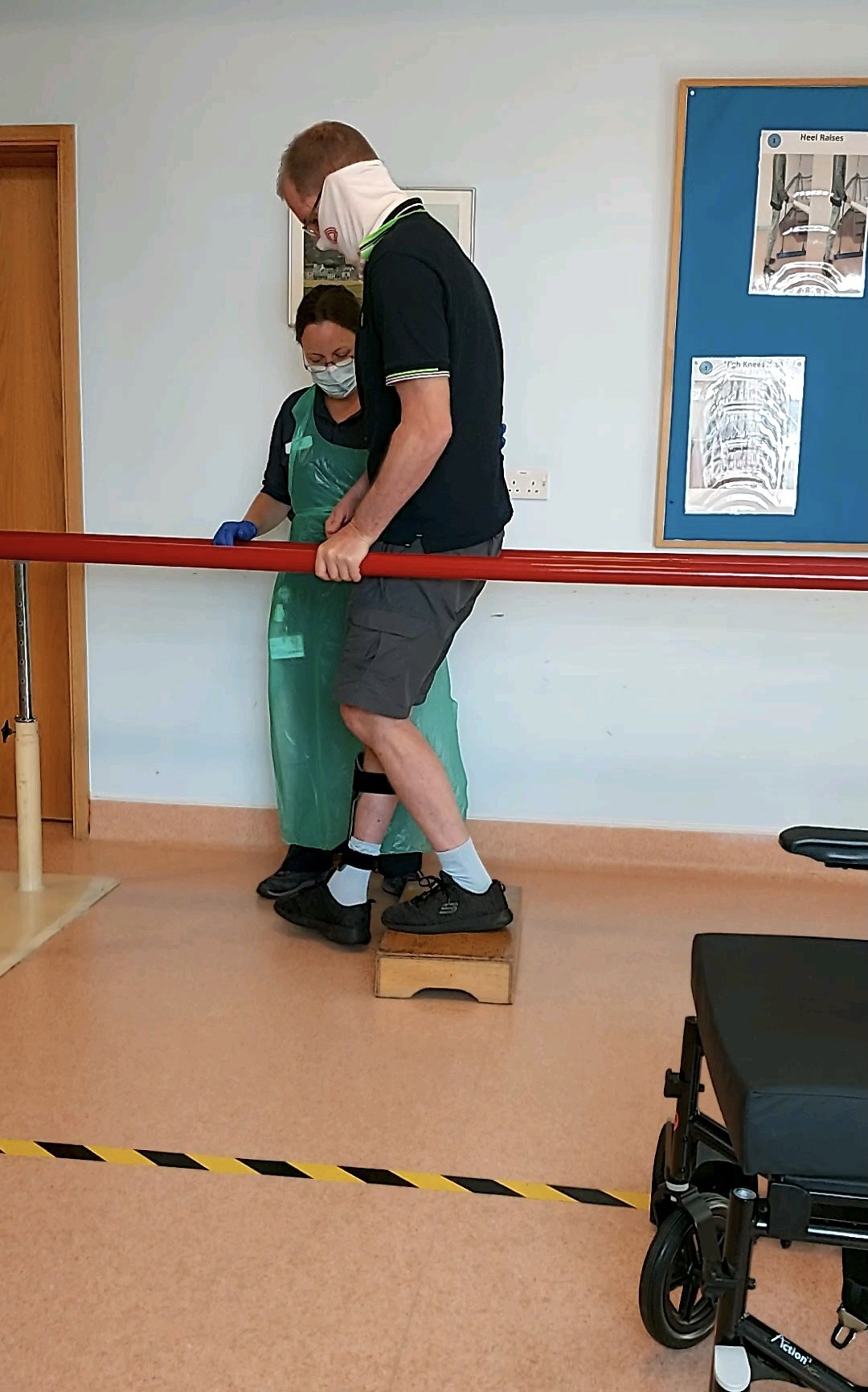
Pictured: Mark learned to walk again at Samarès Ward, where he received “incredible” support from the team there.
“This team worked tirelessly throughout the pandemic, for well over a year, to ensure Mark learned new skills, simple everyday skills, which we all take for granted, but skills which enabled him to gain some independence.
“This team also guided me and gave me the confidence to believe that as a family unit we could carve some normality back into our lives.
“I was able to share with them my anxieties about the overwhelming journey ahead. Mark is still a young man and can now enjoy some of the things that bring life pleasure.
“He is now entering the third year post stroke and continues to show some signs of improvement on a regular basis. I have absolutely no doubt in my mind that Mark could not have reached this stage in his journey without this incredible specialised help and support.
“Therefore, I am astonished and deeply saddened to discover the Community Stroke Team no longer exists.
“I understand from talking to other stroke survivors on the island that the maximum of six weeks inpatient followed by six weeks follow-up care at home is the norm. For those surviving a more severe stroke with more complex needs, going into a care facility is more likely.
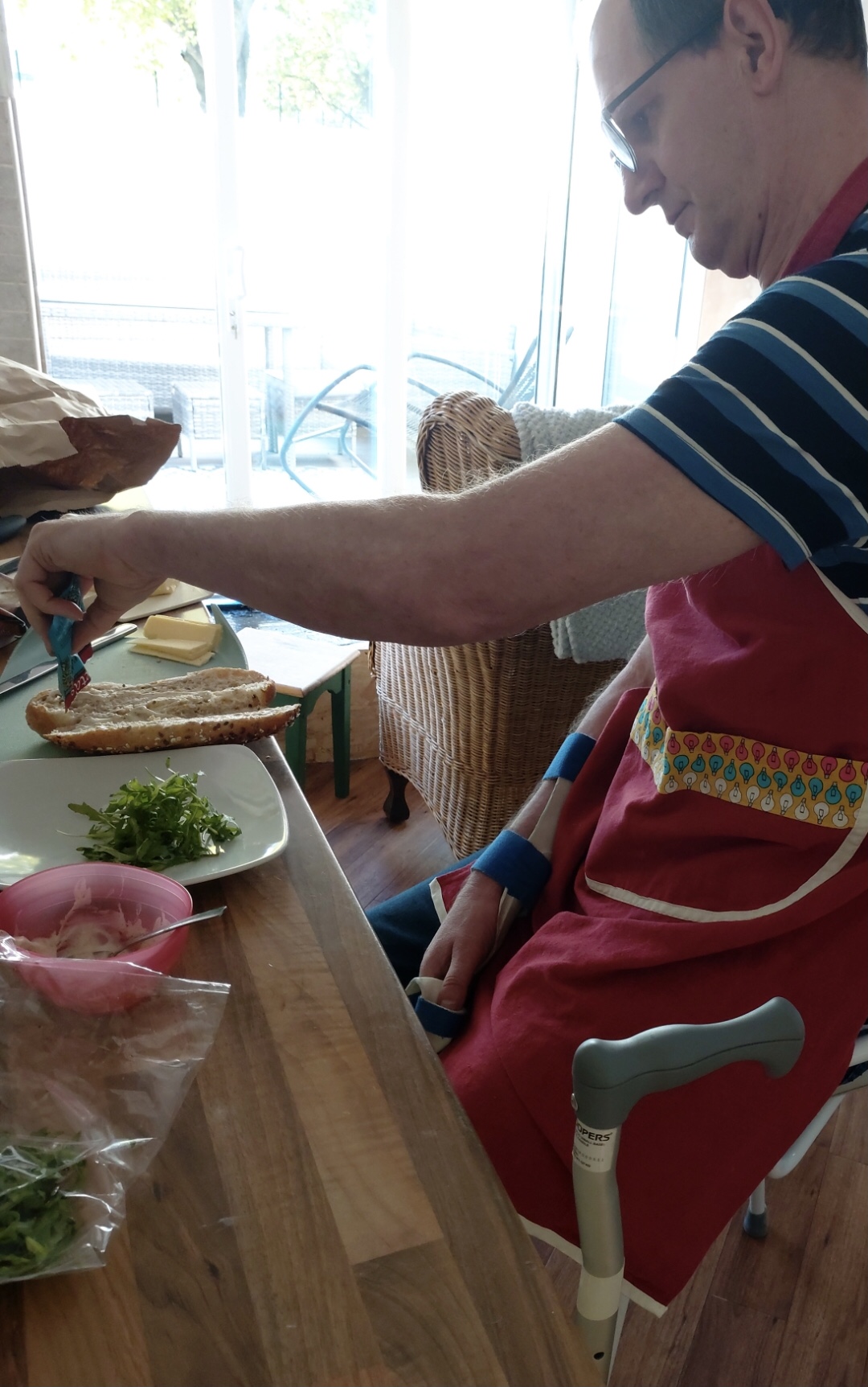
Pictured: Mark has had to relearn life skills, such as preparing a meal.
“The loss of this service is devastating for our community.
”I am deeply concerned for the people in our community who have recently experienced a stroke or will do so in the future, who will not experience such a level of specialised care.
“From experience I do not believe the current fragmented service offers a person the best chance they require to optimise their best out come and quality of life.”
The proposition from Senator Pallett calls on the Government to reopen the rehabilitation ward at Samarès by March. He also wants an assurance that a similar ward will be included in plans for the new hospital or sited somewhere else.
However, the Health Minister Richard Renouf has lodged an amendment, pledging to make improvements at Plémont Ward but removing all references to reopening Samarès.
READER LETTER: Do not have a stroke in Jersey
Future rehab plans unclear ahead of hospital design submission
Constable: Patients and hospital staff "let down" by leaders
Comments
Comments on this story express the views of the commentator only, not Bailiwick Publishing. We are unable to guarantee the accuracy of any of those comments.